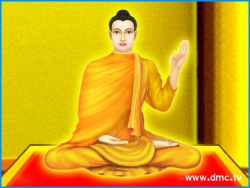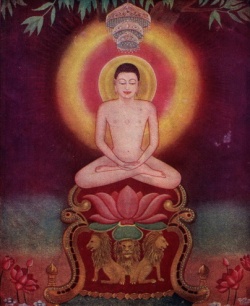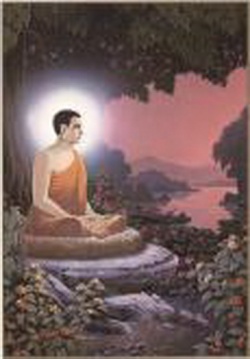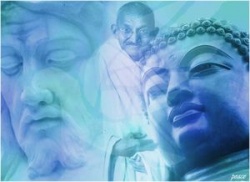Manual of Madhyamika - Reading Six: Taking Joy
The following reading is taken from the Entry Point for Children of the Victorious Buddhas (rGyal-sras ‘jug-ngogs), a commentary by Gyaltsab Je Darma Rinchen (1364-1432) on the book called Guide to the Bodhisattva’s Way of Life (Byang-chubsems-dpa’i spyod-pa la ‘jug-pa) by Master Shantideva (c. 700 AD).
The third part in our explanation of the actual body of the third chapter of the Guide is the conclusion. Here there are two sections: practicing the taking of joy yourself, and bringing joy to others. The first of these has two sections of its own: how the wish achieves your own goals, and how it achieves the goals of others. The first of these will come in three steps: taking joy by uplifting your heart; practicing care once your have attained the wish; and practicing the taking of joy, over having attained a wish that is very hard to find.
Those of intelligence should in this way
Then attain the wish for enlightenment
With great devotion, and in conclusion
Lift up their hearts, in the following manner,
To engage in an ever increasing way.
Those of intelligence, meaning bodhisattvas, should in this way then attain the two forms of the wish for enlightenment, and attain it so it is firm, through thoughts that are filled with great devotion, and gladness, and faith. And they should then, in conclusion, undertake as well a method to keep this state of mind from being lost, and to increase it ever further. It is in order to engage in this state of mind in an ever increasing way that your should take joy, and uplift your heart, in the following manner. [The Entry Point seems to read 'jug here for mjug by mistake.]
With this moment my life has become fruitful;
I have truly achieved a human life
Today I have been born into the family of the Buddhas;
Now I have become a child of the Buddhas.
How is it that we uplift our hearts? With this moment—that is, at the point where I develop the wish and take the vows—my life has become fruitful; now I have truly achieved a human life, in the sense that I have given meaning to the spiritual leisure and fortune with which I was born. Today I have been born into the family of the Buddhas: I have become a bodhisattva. Practice the feeling of gladness, thinking to yourself, “Now I have become a child of the Buddhas”—for this is the prayer wherein one thinks to oneself, “When is it that I will become a child of the Buddhas?”
Now, no matter what, I will undertake
Only those actions which are fitting
For those who belong to the family,
And I will assure that this holy
And faultless family is never defiled.
Here is the second point. You may wonder whether this act alone is enough. It is not, for you must then make the resolution: “Now, no matter what, I will undertake only those actions of the three doors which are fitting for those who belong to the family of my new fathers, the Buddhas. I will keep my family one which is holy, one which is at all times—in the beginning, and during, and at the end of any action—forever made beautiful: faultless, and filled only with wonderful qualities. I will make every effort I can to assure that my mind is never defiled by breaking my vows—the rules that have been set forth for those that are following the wish both in the form of a prayer, and in the form of action.
Suppose a beggar were to find
Some precious jewel in a pile of garbage.
I am just the same, for by dumb luck
I have been able to develop
The wish for enlightenment.
Here is the third point. Suppose a poor and penniless beggar were to find some precious jewel in a pile of garbage. I am just the same, for by “dumb luck”—that is, through simple good fortune—I have been able to develop this precious wish for enlightenment. It is surely only something that has happened through the miraculous power of the Enlightened Ones.
How the wish achieves the goals of others we will cover in three steps as well, describing how it has the power to remove the sufferings of living beings, how it has the power to remove the obstacles that cause these sufferings, and finally how it has the power to accomplish all help and happiness. The first of these three has five parts of its own: descriptions of how the wish destroys the Lord of Death within every living being; how it destroys poverty; how it destroys illness; how it destroys the general suffering of the cycle of life; and, more particularly, how it destroys the sufferings of the lower realms.
The supreme nectar of deathlessness,
Which acts to destroy the Lord of Death
Within every living being, is as well this wish.
Here is the first of the five. There is a supreme nectar of deathlessness, one which acts to destroy the Lord of Death within every living being—which stops this condition of having helplessly to die. And the nectar is this wish for enlightenment, because it leads us to the state where there is no aging, and no death.
This same wish is an endless
Treasure house which removes
The poverty of every living thing.
Here is the second. There is as well an endless treasure house which removes the poverty of every living thing, for it grants never-endingly a wealth of both material things and the Dharma. The treasure too is this same wish for enlightenment.
This same wish is a supreme medicine
Which puts a final end
To the illness of living kind.
Here is the third. There is a supreme medicine which puts a final end to every illness of living kind, and it too is this same wish.
The wish is a great tree which refreshes
All those beings who have tired themselves
Wandering along the road of cyclic existence.
Here is the fourth. There is a great tree which provides a cool spot that refreshes and clears away the sufferings of all those beings who have tired themselves by wandering along the road of the cycle of existence. This too is the wish.
The wish is a great span
That allows all living beings
To escape from the lower realms.
Here is the fifth. There is a great span, a bridge, that allows all living beings to escape from the lower realms. This too is the wish.
The wish is a moon that rises
In the mind, to clear away
The mental afflictions
That torment living creatures.
The power of removing obstacles we will cover in two parts: how the wish removes the obstacles that are mental afflictions, and then how it removes the obstacles to total knowledge. Here is the first. The wish for enlightenment is a moon that rises in the mind, to clear away with its cool light all the heat of the mental afflictions, which torment living creatures. This is because it has the power to destroy each and every one of the obstacles which are mental afflictions.
The wish is a great sun
That rises to obliterate,
To rip out, the cataracts,
The lack of knowledge,
In every living being.
Here is the second part. The wish is also a great sun that rises to obliterate—that is, to rip out from its roots—the cataracts of the obstacles to total knowledge in every living being: the lack of knowledge which is not directly related to the mental afflictions. This is because the state of wisdom which perceives emptiness, and which is further enhanced by great accumulations of good deeds, functions to terminate completely the very seeds of the obstacles to total knowledge.
The wish is the very essence
Of butter, distilled from churning
Here thirdly is how the wish achieves the goals of others, in two stages of how it brings about every kind of benefit, and how it brings about every kind of happiness. This wish for enlightenment is the very essence, something that has been distilled from the great ocean of the milk of the holy Dharma, the highest of all spoken words. It has been distilled through the process of churning this milk with the great paddle of wisdom which has come from listening and contemplation. It is like a great heap of the very essence of butter, a butter that has a special nutritional value, in that it can help everything of any kind of benefit at all to grow. As such, everyone should make efforts to reach this state of mind.
Sentient beings are travelers
Wandering here and there
Along the roads of the three realms,
Hoping to win pleasant experiences.
This wish remains the highest method
Of all for happiness: it brings
Satisfaction to all these travelers,
Every living being.
Here is the second point. Sentient beings are like travelers who are wandering in the cycle of suffering: they wander here and there along the roads of the three realms, and hope to win all the pleasant experiences of a birth among humans, or the pleasure beings. It is this wish for enlightenment which remains the highest method of all for achieving happiness: it brings satisfaction to all these travelers, every living being. This is because it allows all living kind to reach the higher realms, and definite goodness.
I stand today in the presence
Of all the Protectors.
I invite every living creature
As my guest, to partake
In the very state of Those
Who have Gone to Bliss, and in
Happiness until they reach it.
I call on every pleasure being,
All such creatures, to take joy
In this as well.
With this we have reached how to bring joy to others. I stand today in the presence of all the Protectors: the victorious Buddhas, and their sons and daughters. And in your presence I invite every living creature, every being, to come here as my guest, for I will serve them to their heart’s content the very state of Those Who have Gone to Bliss: the ultimate culmination of every kind of help and happiness. And until they reach this state I offer them as well to partake, to their own satisfaction, all the happiness that can be found among humans and pleasure beings. And once I have made this invitation, I ask others to take joy as well: I call on every pleasure being, and near pleasure being, and serpent-like naga, and all such creatures to feel gladness.
As Master Shantideva’s text explains, there are certain preliminaries that must be fulfilled before one can develop the wish for enlightenment. We must purify ourselves of the obstacles which are factors that work against being able to develop the wish, and we must gather together all the factors that are conducive to reaching it. You should understand that this process, of undertaking all the preliminaries and then reaching the wish itself, is the very highest way of all to get the essence out of having achieved this human body and mind, with all their spiritual leisure and fortune. As such we must make great efforts in the practice of these preliminaries.
All those ones of intelligence
Who have reached a body
With spiritual leisure and fortune
Should make every effort in finding
The two forms of the wish,
For this is the essential point
Of all the highest of words—
The teachings of the Victors,
And the one and only road
Travelled by many millions
Of their sons and daughters too.
This is just a brief verse, to summarize the chapter.
This concludes the third chapter of the Guide to the Bodhisattva’s Way of Life, entitled “Attaining the Wish for Enlightenment.”
Here finally we cover the name of the chapter. This then is the explanation of the third chapter, the chapter on attaining the wish for enlightenment, from the “Entry Point for the Sons and Daughters of the Victorious Buddhas,” a commentary upon the Guide to the Bodhisattva’s Way of Life.
See Also
- Manual of Madhyamika - Reading One: Author, Structure, and History of the Text
- Manual of Madhyamika - Reading Two: The Benefits of the Wish for Enlightenment
- Manual of Madhyamika - Reading Three: How to Make Offerings
- Manual of Madhyamika - Reading Four: The Four Forces of Purification, Part One
- Manual of Madhyamika - Reading Five: The Four Forces of Purification, Part Two
- Manual of Madhyamika - Reading Six: Taking Joy
- Manual of Madhyamika - Reading Seven: How to Fight the Mental Afflictions, Part One
- Manual of Madhyamika - Reading Eight: How to Fight the Mental Afflictions, Part Two
- Manual of Madhyamika - Reading Nine: Awareness
- Manual of Madhyamika - Reading Ten: The Perfections of Giving and Ethical Living




